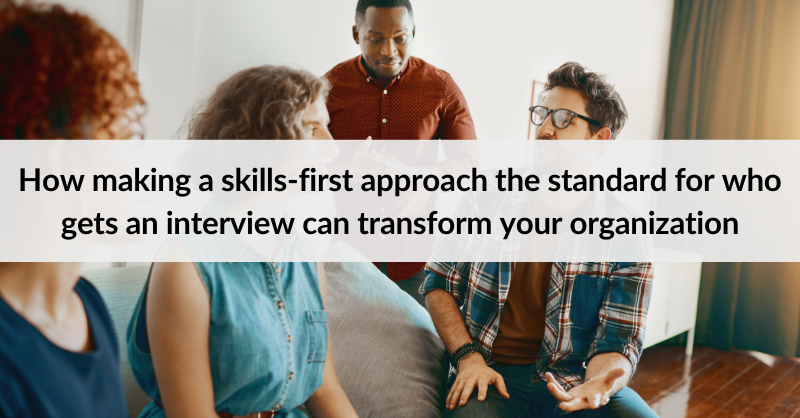.png)
Missing out on untapped talent? Here's how to fix it.
With college students back in class, campus recruiting is officially in full swing. Based upon the initial results, this year is looking like another unusual one for employers. Many are sharing their struggles to engage students and build a large enough, diverse pool of candidates - they already have real concerns about achieving their recruiting goals.
While these recruiters are struggling to “get through the noise” even with their investments in virtual platforms, many are ignoring a key, competitive advantage that only they have: existing employees at their company.
Yeah, we know that employees are already participating in panels, mentoring, and other events, all of which are great. However, the real opportunity provides much more impact.
Instead of connecting employees and candidates through artificial “recruiting events,” let candidates experience your company, its culture, and its people through real, professional work. Not only does this help get through the noise to showcase your company (including to those who weren’t planning to apply or even attend your info session), but it also provides a valuable resource for your colleagues across the organization.
In addition, this approach also drives progress towards the diversity and inclusion goals, especially within organizations where hiring managers are still focused on the “traditional” candidates. For example, as John Vlastelica shares in this week’s first featured article, there are great opportunities to use #FOMO, or the fear of missing out, to overcome this challenge. For example, "If you have hiring managers who are hyper-focused on sourcing only from specific companies and schools, refocus the conversation on the work that has to be done and the skills needed." A great way to do this is through Micro-Internships which, as highlighted in the article, allow hiring managers to see the candidates' skills firsthand and can help overcome these preconceived notions of the "right" candidate's academic pedigree or background.
Jeffrey Moss, Founder and CEO
Articles of the Week
How Recruiters Can Use #FOMO to Hire More Untapped Talent - LinkedIn Talent Blog
Beyond “Train and Pray”: State Training Policies to Connect Workers to Good Jobs - New America
Defining the Skills Citizens Will Need in the Future World of Work - McKinsey & Company
How Recruiters Can Use #FOMO to Hire More Untapped Talent - LinkedIn Talent Blog
“I want hiring managers to realize that they’re missing out on a ton of capable talent by overfocusing on university and company pedigree, credentials, years of experience, and job titles over skills.”
It’s time to reframe the hiring manager mindset from false-positive hiring decisions (making a bad hire) to false-negative hiring decisions (missing out on a good hire). The solution? Framing hiring choices with #FOMO, or the fear of missing out. This article highlights strategies for widening your company’s hiring aperture, using #FOMO when talking to your hiring teams about diversity, and highlighting (then sharing) stories of candidates who maybe didn’t fit the “ideal,” but still performed well.
Related reading: How Micro-Internships Can Bring Diversity, New Perspectives, and Talent to Employers
Beyond “Train and Pray”: State Training Policies to Connect Workers to Good Jobs - New America
“State policies can support effective, employer-connected training programs and overall economic growth by providing targeted financial support for training participants, training providers, and employers who provide training themselves.”
As the pandemic amplifies labor market challenges facing workers, state-funded workforce training programs have received a lot of buzz. In particular, Washington and Indiana have created policy systems that fund “career-relevant workforce training to help learners into better jobs and further educational opportunities.” Similarly, as we’ve seen with the Kansas Micro-Internship Program, these types of opportunities are especially useful for early-career talent who have missed out on a year-plus of professional growth opportunities. Check out the full report for insights on the case studies, plus policy recommendations.
Related reading: Student Success: Lily’s Kansas Micro-Internships
Defining the Skills Citizens Will Need in the Future World of Work - McKinsey & Company
“The need for manual and physical skills, as well as basic cognitive ones, will decline, but demand for technological, social and emotional, and higher cognitive skills will grow.”
With the workforce becoming increasingly automated as AI and robotics take hold, core skills—including cognitive, interpersonal, and self-leadership capabilities—are becoming all the more pivotal for workers, and especially for early-career talent. Research from McKinsey identifies 56 core skills that “will help citizens thrive in the future of work,” plus three actions governments can take to promote the growth of core skills.
Related reading: 2021 Top Skills Across Entry-Level Roles
For more stories and insights on HR, recruiting, and diversity, click here to subscribe to our weekly newsletter Hire Learnings.



.png)
.png)